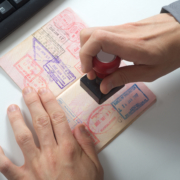The Expanding Role of the Travel Manager
(January, 2022)
Today’s companies are identifying new ways to grow their business in an ever-changing environment, with new challenges and new expectations arising every day. The role of Travel Managers around the world, and their related responsibilities, has risen in visibility at the executive level largely due to the need for stronger risk management initiatives as well as cost containment and recovery efforts. These expectations have highlighted the need for an expansion of skill sets and the broadening of industry knowledge as they effectively engage with cross-functional leadership throughout their organizations.

The core role of the Travel Manager is to direct, operate and administer travel programs and services for their company. This entails the need to oversee budgets, identify areas of cost containment and bring on partners by way of preferred suppliers and travel management services to improve the efficiency, traveler safety and data capturing.
Over the years, the responsibility of managing travel has shifted towards the Procurement and Finance divisions of organizations as the programs have largely been viewed as a cost center. The role for most small and midsize organizations many times includes other line item responsibilities outside of travel, which allows for generalized expectations of industry knowledge, relying on the employees to follow the policy, and partners to support the program’s core needs. These core needs have largely focused on ensuring the lowest prices are in place through their preferred partners and building out guidelines for travelers to understand their responsibilities as they travel on behalf of the company.
Within this generalized approach, responsibilities of the Travel Manager historically required:
- the need to develop and centralize the travel functions, policy and managing processes for travel related disruptions
- ability to analyze spend reports and recommend changes as appropriate to support balancing the needs of the traveler and company controls
- develop relationships with suppliers and ensure services are delivered per agreements, measuring performance and identifying areas of further opportunity
- keep current on general industry trends for future travel and budget planning and train employees on travel policies, booking tools or other technologies implemented

The new role of the Travel Manager, irrelevant to the size of the business, is dramatically expanding with new expectations and responsibilities. As we all experienced in March of 2020, travel management became an entirely new face of the company with the need for real-time data, traveler location monitoring, and the flexibility to easily shift policy and communicate changes as required. The Travel Manager became a key stakeholder within the Risk Management, Human Resource and Finance teams literally overnight.
Today’s Travel Managers have each embedded new processes that include traveler monitoring, management and prioritization of unused tickets, and either have, or are shifting, to a more Managed Program rather than a stand-alone policy with company guidelines. They have identified gaps in technology and services and solved for these challenges through their TMC partners, as well as investigating other 3rd party providers.
As travel continues to rebound, further expectations are being placed on the Travel Manager.

Domestic and International Safety Protocols: The pandemic has taken many turns and shifts that impact both domestic and international travel. The Travel Manager is now being required to ensure that clear and up-to-date information is in place for the traveler to understand vaccination requirements, testing timelines, and masking protocols to either enter a county, conference or restaurant.
Accommodations: Most travel programs have been successful with ensuring the air portion of the ticket is made through their preferred online booking platform or via a travel consultant. However, accommodations are becoming an even greater focus as not only is the knowledge of the traveler’s location imperative, but the quality, safety and security of each property and the measures being taken onsite for cleanliness and meeting the needs of the travelers is necessary to ensure traveler satisfaction.

Aligning with Human Resources: Balancing the culture of the company, growth expectations and traveler personal preferences is becoming more challenging for all companies. The Travel Manager must work in alignment with the HR division to delicately manage the employees’ comfort levels to travel on behalf of the company, as well as balance their personal positions related to vaccination to the requirements of industry events. They are also expected to have processes and communication capabilities in place to respond to changing global travel dynamics, including weather, political unrest, and industry employee strikes in order to effectively and proactively identify a potential risk; the processes in place should also support the traveler and escalate as appropriate within HR guidelines.
Best Possible Traveler Experience: Today’s program needs to include a fundamental framework that, to the best of its ability, provides the best possible travel experience for employees. This requires staying engaged with the travelers to understand their experiences from recent trips through post travel surveys, ensuring they feel comfortable, safe and secure whether at the airport, in a rental car or at their company preferred accommodations.
Self-Service Technology: Today’s travelers are much more self-reliant and prefer in most instances to have self-serve technology available to them. They want the ability to book and cancel their tickets as required, easily access entry requirements both domestically and internationally, and when contacting a consultant for assistance, have the choice to email, chat or receive a call back.

Travel Managers are now being tasked with the need for data analytics that provide not only traveler monitoring, but also spend management based initially on historical trends as well as predictive analytics to identify future savings potential to support proactive budget setting and management.
Sustainability: Many companies are embracing the need to understand their carbon footprint across all areas of the business, including travel. Travel Managers are expected to understand travel industry initiatives underway to reduce the impact on carbon emissions and incorporate these components when going out to bid for their preferred partners globally. The Travel Manager is being required to identify their current carbon footprint based upon industry standards and put forth policies that align with the preferred suppliers and the need for a more purposeful travel program. This will evolve into new ways of designing the policy based upon each company’s commitment to sustainability and culture.
As the return to travel continues, so does the ever evolving role of the Travel Manager. The importance of subject matter experts is at its highest in decades and is elevating the position within all cross-functional areas of the company. At Travel Incorporated, we appreciate the increasing demands of this role and are committed to providing you with the technology, service and personalized support to bring efficiencies and the highest value possible to your program.












Leave a Reply
Want to join the discussion?Feel free to contribute!